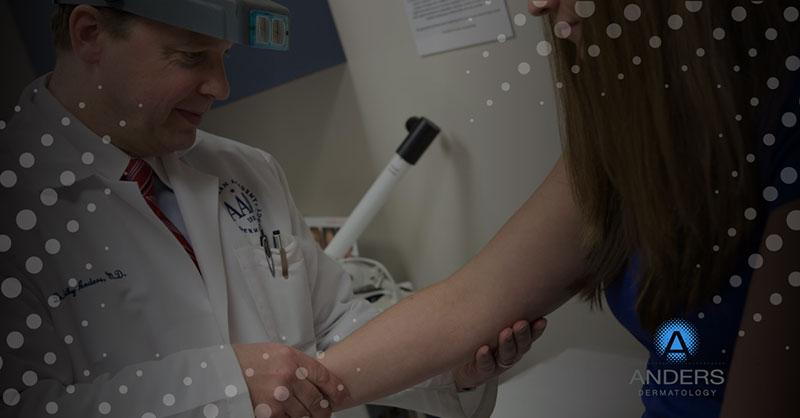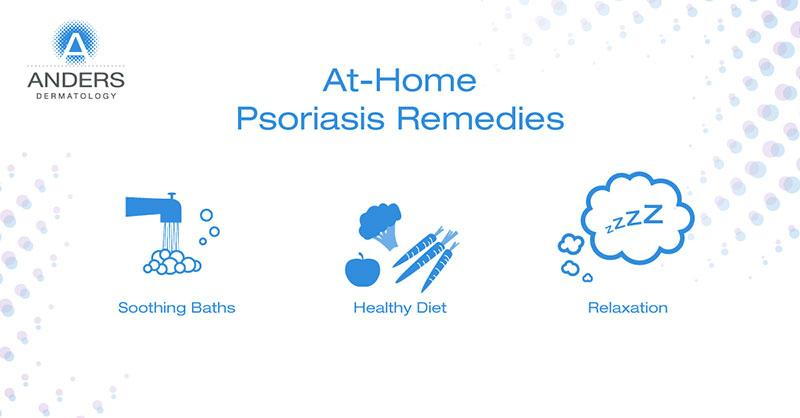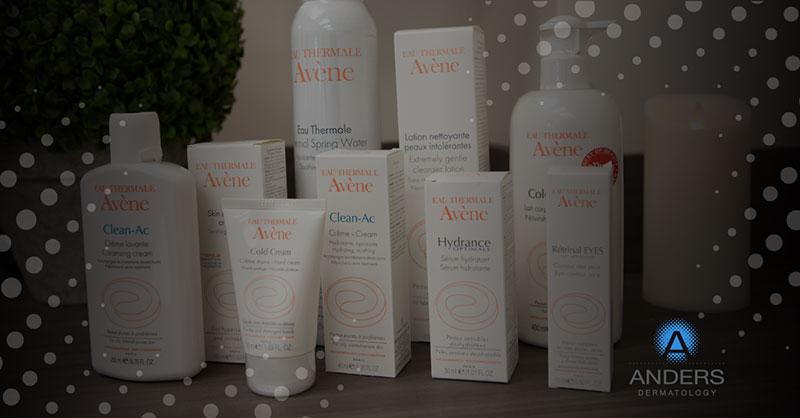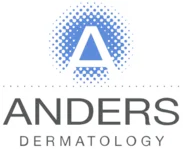Psoriasis is a skin condition that causes cells to build up and form scales or itchy, dry patches. While the most prominent part of the condition is not visible and occurs under the skin, the cells grow and rise so quickly that they pile up on the surface.

There are five types of psoriasis:
- Plaque Psoriasis – most common form; thick, red patches of skin with white or silver scales
- Guttate Psoriasis – small, red spots on skin; may develop into plaque psoriasis over time
- Pustular Psoriasis – pus-filled blisters, sometimes scaling; affects all skin or one area
- Inverse Psoriasis – very red, shiny and smooth; can be extremely irritating
- Erythrodermic Psoriasis – rarest form; very painful, can look like severe burns
Psoriasis is chronic—meaning it can stick around for years, or even the rest of your life. While a cure has yet to be found, there are treatments available to help make the condition more manageable by slowing down cell growth and removing uncomfortable scales or patches of skin.
AT-HOME PSORIASIS REMEDIES
Bath treatments are a fast and easy way to help soothe your psoriasis—and some remedies use products you may already have in your kitchen cupboard! A lukewarm bath filled with Epsom salt, dead sea salt, mineral oil or olive oil can reduce itchiness and get rid of scales and plaques. If you are using a bath remedy, be sure to moisturize immediately afterwards to maximize its benefits. Olive or vegetable oil—a staple in most pantries—can be applied directly to uncomfortable patches of skin, and even massaged into an irritated scalp.

ADJUSTING YOUR DIET TO REDUCE PSORIASIS SYMPTOMS
When dealing with any condition or disease, evaluating your diet is a must. Foods and supplements affect people differently, so adding or removing certain items from your diet may help. Abstaining from eating red meat and fatty foods has proven to help keep skin from acting up. For some people, gluten can have a negative impact on their skin. If you notice any changes in your psoriasis when you consume wheat, barley or rye, you may want to consider going gluten-free.
Some beneficial additions to your diet are soy, nuts, chocolate and cranberries. These are easy to either snack on or to add to meals, and they have incredible health benefits on top of what they can do for your skin. You should also make sure that you’re drinking enough water to stay hydrated, as well as eating colorful fruits and veggies. These are crucial to your condition—and to your overall well-being! Eating salmon, tuna and other fish that are rich in omega-3 fatty acids have also been proven to help reduce any inflammation.
Tip: Before adding or removing items from your diet, it’s a good idea to consult with your doctor and keep a food diary.
RELAXATION IS KEY FOR PREVENTING FLARE-UPS
Psoriasis has no end date, no cure—and though it can seem like there’s no hope, staying positive is key! When it comes down to it, your stress levels actually have a lot to do with your psoriasis. If you find yourself feeling self-conscious or anxious about your condition, it’s time to take a deep breath and relax.
To relieve some tension and take your mind off of your stressors, why not schedule a massage? Just make sure the massage specialist is aware of your condition, because the oils and lotions they use could irritate your skin. Beginning a yoga practice is another great way to stay calm and keep your mind off of everyday tasks. If these don’t sound like they would work for you, explore your relaxation options until you find your happy place! Stress is among one of the many triggers that can cause your condition to act up.
PSORIASIS—TAKING ACTION
If you haven’t had much luck with diet changes, at-home solutions and relaxation methods, don’t fret. While DIY remedies are proven effective for some, others benefit from consulting a skin care specialist to learn how more advanced products can help them get the care they need. The specialists at Anders Dermatology recommend Avene products to help our patients managing psoriasis.
Avene Thermal Spring Water is great for rinsing skin that is sensitive to chlorine, or for skin that has been affected by hard or over-softened tap water. It comes from a natural spring in France, containing minerals and a phyto organism that helps reduce inflammation. Avene Xeracalm comes in a cleansing oil, moisturizing balm and moisturizing cream—hydrating and helping to repair skin. This product reduces itchiness and is safe for all skin types.

If you’re ready to take action and try treatments specially designed to help skin conditions like psoriasis, the experts at Anders Dermatology can help! Avene products are offered in-house, and our specialists are available for consultations. To schedule an appointment or learn more about our practice, give us a call at 419.473.3257.

